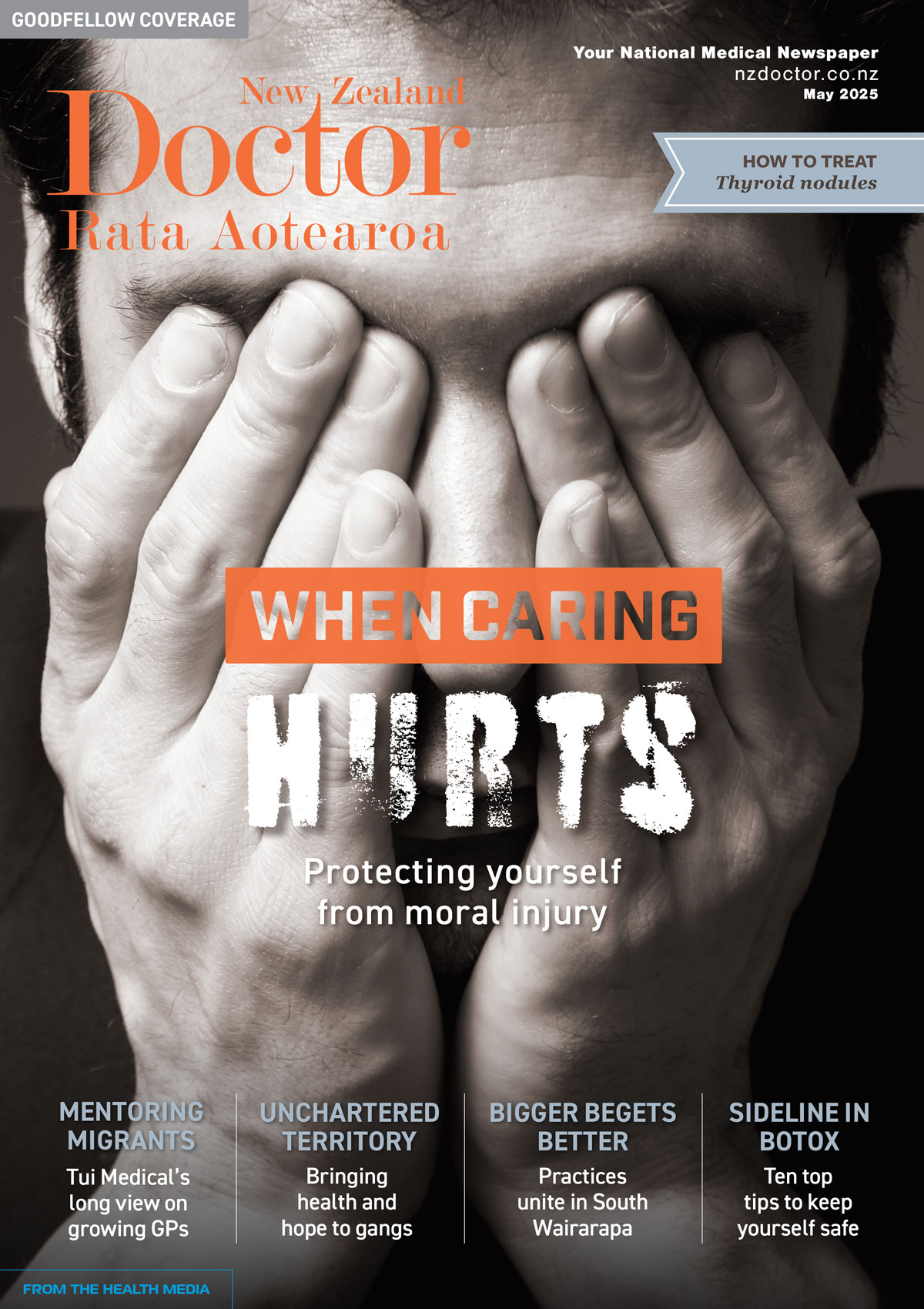Respiratory physician Lutz Beckert considers chronic obstructive pulmonary disease management, including the prevention of COPD, the importance of smoking cessation and pulmonary rehabilitation, and the lifesaving potential of addressing treatable traits. He also discusses the logic of inhaler therapy, moving from single therapy to dual and triple therapy when indicated, as well as other aspects of management
Infectious Diseases Research Platform, Te Niwha launches first report: Likely Pandemic Agents and Scenarios – an Epidemiological and Public Health Framework
Infectious Diseases Research Platform, Te Niwha launches first report: Likely Pandemic Agents and Scenarios – an Epidemiological and Public Health Framework

Preventing severe illness, saving lives and minimising disruption to New Zealanders’ lives is the aim of the first report from Te Niwha, the Infectious Diseases Research Platform.
Likely Pandemic Agents and Scenarios – an Epidemiological and Public Health Framework, was developed in collaboration with Te Pou Hauora Tūmatanui | The Public Health Agency, within the Ministry of Health, to provide a comprehensive approach that considers a range of scenarios and agents, new technologies, and lessons from the COVID-19 pandemic.
The executive summary was released at the Te Niwha hosted Aotearoa New Zealand Infectious Diseases and Pandemic Preparedness Summit attended by more than 140 delegates in Christchurch early last week.
Te Niwha Chief Science Advisor and highly regarded infectious disease epidemiologist Distinguished Professor Nigel French led the report team. He says it “draws on the expertise and experience of experts directly involved in the COVID-19 pandemic and other public health emergencies”.
Professor French summarised the rationale for the framework for the delegates at the Christchurch Summit: “Aotearoa needs to be better prepared to deliver a more equitable response to future pandemics and other infectious disease outbreaks. We provide a framework for developing a more robust and equitable approach, including community led initiatives, to protect our population from a wide range of potential pandemic agents.”
The report covers: A) Specific Potential Pandemic Agents, B) Pandemic planning and preparedness: Scenarios of pandemic agents and capabilities required, and C) Pandemic response: Impact assessment, strategy development and control measures.
Public Health Agency Chief Adviser Epidemiology, Dr Fiona Callaghan, one of the report’s co-authors, says the framework helps characterise future pandemics, the challenges of different types of pandemics and how Aotearoa New Zealand can prepare for them. “It also highlights the importance of using the time between pandemics to build up the knowledge, relationships, ways of working and technical capacity across of wider range of areas to respond effectively to the next pandemic. This report was a great opportunity for communities, academics and government agencies to come together to further our understanding of pandemics and their impacts in Aotearoa New Zealand."
Te Niwha Director Te Pora Thompson says: “The report’s release is timely and will be a significant tool across stakeholders for planning, and particularly for Te Niwha to ensure that we close the gaps in our research efforts for world-class capability for preparedness”.
Expert researchers, community, Iwi and agencies gathered to share and discuss pressing issues and opportunities for the research platform’s key research priority areas: Prevention, Surveillance, Diagnostics and Therapeutics.
The Summit opened with retiring Ngāi Tahu Chair, Lisa Tumahai on the local, regional and national Māori response within the recent pandemic. Sir Andrew Pollard of Oxford University addressed the delegates in a pre-recorded talk on international reflections of the recent pandemic, vaccine development and public health.
Sir Jerry Mataparae led a special presentation of Te Niwha Masters and Doctoral scholarships. The Lifting Future Leaders session featuring five students receiving scholarships set the tone across the Summit for the platform’s Mission: to ensure that Aotearoa New Zealand has world class research capability for emerging and current infectious diseases threats and pandemic preparedness.
Talks and panel discussions with leading experts featured topics of human-animal interface and transdisciplinary approaches, diagnostic and vaccine development advances, alongside over 30 short presentations.




![Barbara Fountain, editor of New Zealand Doctor Rata Aotearoa, and Paul Hutchison, GP and senior medical clinician at Tāmaki Health [Image: Simon Maude]](/sites/default/files/styles/thumbnail_cropped_100/public/2025-03/Barbara%20Fountain%2C%20editor%20of%20New%20Zealand%20Doctor%20Rata%20Aotearoa%2C%20and%20Paul%20Hutchison%2C%20GP%20and%20senior%20medical%20clinician%20at%20T%C4%81maki%20Health%20CR%20Simon%20Maude.jpg?itok=-HbQ1EYA)
![Lori Peters, NP and advanced health improvement practitioner at Mahitahi Hauora, and Jasper Nacilla, NP at The Terrace Medical Centre in Wellington [Image: Simon Maude]](/sites/default/files/styles/thumbnail_cropped_100/public/2025-03/2.%20Lori%20Peters%2C%20NP%20and%20advanced%20HIP%20at%20Mahitahi%20Hauora%2C%20and%20Jasper%20Nacilla%2C%20NP%20at%20The%20Terrace%20Medical%20Centre%20in%20Wellington%20CR%20Simon%20Maude.jpg?itok=sUfbsSF1)
![Ministry of Social Development health and disability coordinator Liz Williams, regional health advisors Mary Mojel and Larah Takarangi, and health and disability coordinators Rebecca Staunton and Myint Than Htut [Image: Simon Maude]](/sites/default/files/styles/thumbnail_cropped_100/public/2025-03/3.%20Ministry%20of%20Social%20Development%27s%20Liz%20Williams%2C%20Mary%20Mojel%2C%20Larah%20Takarangi%2C%20Rebecca%20Staunton%20and%20Myint%20Than%20Htut%20CR%20Simon%20Maude.jpg?itok=9ceOujzC)
![Locum GP Helen Fisher, with Te Kuiti Medical Centre NP Bridget Woodney [Image: Simon Maude]](/sites/default/files/styles/thumbnail_cropped_100/public/2025-03/4.%20Locum%20GP%20Helen%20Fisher%2C%20with%20Te%20Kuiti%20Medical%20Centre%20NP%20Bridget%20Woodney%20CR%20Simon%20Maude.jpg?itok=TJeODetm)
![Ruby Faulkner, GPEP2, with David Small, GPEP3 from The Doctors Greenmeadows in Napier [Image: Simon Maude]](/sites/default/files/styles/thumbnail_cropped_100/public/2025-03/5.%20Ruby%20Faulkner%2C%20GPEP2%2C%20with%20David%20Small%2C%20GPEP3%20from%20The%20Doctors%20Greenmeadows%20in%20Napier%20CR%20Simon%20Maude.jpg?itok=B0u4wsIs)
![Rochelle Langton and Libby Thomas, marketing advisors at the Medical Protection Society [Image: Simon Maude]](/sites/default/files/styles/thumbnail_cropped_100/public/2025-03/6.%20Rochelle%20Langton%20and%20Libby%20Thomas%2C%20marketing%20advisors%20at%20the%20Medical%20Protection%20Society%20CR%20Simon%20Maude.jpg?itok=r52_Cf74)
![Specialist GP Lucy Gibberd, medical advisor at MPS, and Zara Bolam, urgent-care specialist at The Nest Health Centre in Inglewood [Image: Simon Maude]](/sites/default/files/styles/thumbnail_cropped_100/public/2025-03/7.%20Specialist%20GP%20Lucy%20Gibberd%2C%20medical%20advisor%20at%20MPS%2C%20and%20Zara%20Bolam%2C%20urgent-care%20specialist%20at%20The%20Nest%20Health%20Centre%20in%20Inglewood%20CR%20Simon%20Maude.jpg?itok=z8eVoBU3)
![Olivia Blackmore and Trudee Sharp, NPs at Gore Health Centre, and Gaylene Hastie, NP at Queenstown Medical Centre [Image: Simon Maude]](/sites/default/files/styles/thumbnail_cropped_100/public/2025-03/8.%20Olivia%20Blackmore%20and%20Trudee%20Sharp%2C%20NPs%20at%20Gore%20Health%20Centre%2C%20and%20Gaylene%20Hastie%2C%20NP%20at%20Queenstown%20Medical%20Centre%20CR%20Simon%20Maude.jpg?itok=Z6u9d0XH)
![Mary Toloa, specialist GP at Porirua and Union Community Health Service in Wellington, Mara Coler, clinical pharmacist at Tū Ora Compass Health, and Bhavna Mistry, specialist GP at Porirua and Union Community Health Service [Image: Simon Maude]](/sites/default/files/styles/thumbnail_cropped_100/public/2025-03/9.%20Mary%20Toloa%2C%20Porirua%20and%20Union%20Community%20Health%20Service%20in%20Wellington%2C%20Mara%20Coler%2C%20T%C5%AB%20Ora%20Compass%20Health%2C%20and%20Bhavna%20Mistry%2C%20PUCHS%20CR%20Simon%20Maude.jpg?itok=kpChr0cc)